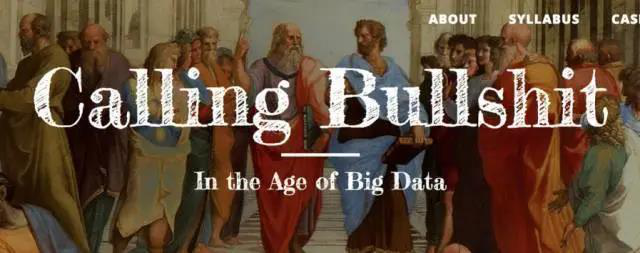大學教授教你如何駁斥科學中的“狗屁”們
美國“21世紀核心技能”(21st Century Skills)和歐盟的“核心素養”(Key Competences)中都提到“網絡素養”是一種非常關鍵的素養。在中國,《中國學生發展核心素養》中也有提到需要掌握的這項綜合能力。 華盛頓大學西雅圖的一門課程《抵制狗屁》或許是你掌握這項素養的一個好選擇。 我今天要跟大家介紹的這門《Calling Bullshit In the Age of Big Data》——課名直譯過來大概是“數據洪流時代,如何駁斥狗屁”。 這門課由位于美國華盛頓州西雅圖市的University of Washington開設,目前只有1個學分,明年計劃拓展到3-4個學分。授課老師是生物系的Carl Bergstrom和信息學院的Jevin West兩位教授。在大學課程的名字里面使用“狗屁”這種粗俗的語言顯然是有點讓人驚掉下巴的。但是在網站的問答環節,兩位老師也作出了解釋。他們說,實在找不到更好的替代詞(哈哈哈哈哈哈,說實話還是不如我們漢語博大精深),如果覺得“bullshit”這個詞太粗俗的話,就用“bull”吧。不過他們也表示: But let’s be honest: we like the fact that the term is profane. After all, profane language can have a certain rhetorical force. “I wish to express my reservations about your claim” doesn’t have the same impact as “I call bullshit!” 大概意思就是說臟話還是鏗鏘有力哈。 兩位老師是這樣定義“bullshit”的: Bullshit involves language, statistical figures, data graphics, and other forms of presentation intended to persuade by impressing and overwhelming a reader or listener, with a blatant disregard for truth and logical coherence. (說白了就是啥也不顧一頓瞎咧咧,而且容易誤導大眾) Calling bullshit is a speech act in which one publicly repudiates something objectionable. The scope of targets is broader than bullshit alone. You can call bullshit on bullshit, but you can also call bullshit on lies, treachery, trickery, or injustice. (其實要辯駁的不止科學中的狗屁,范圍大了去了,什么謊言啊,背叛啊都算在內) 這門課的培養目標包括: 對信息時代中的各種狗屁有辨別力; 知狗屁然,更知其所以然; 用統計學和科學方法技術性的分析這些狗屁; 不管是迷信老阿姨還是種族主義的大叔,你得能說服他/她。 兩位老師表示:這門課上學到的東西,肯定是你整個大學期間學到的有用、應用范圍廣的能力(辯證思維的完美體現)。 END







